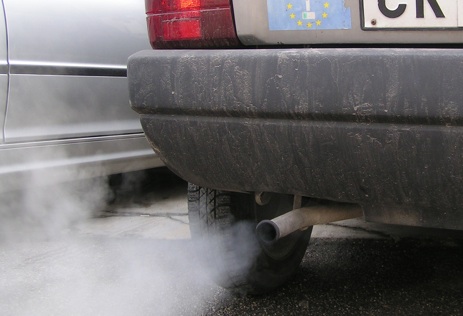 Running your car in an enclosed garage is one way to kill yourself — so why do it outside?Photo: Simone RamellaSomeday our descendants will get around solely by hover-monorail and electric car, and it will blow their cybernetically-enhanced minds that there ever lived a race backward enough to huff automobile exhaust for an hour a day during its collective commute.
Running your car in an enclosed garage is one way to kill yourself — so why do it outside?Photo: Simone RamellaSomeday our descendants will get around solely by hover-monorail and electric car, and it will blow their cybernetically-enhanced minds that there ever lived a race backward enough to huff automobile exhaust for an hour a day during its collective commute.
Until then, we have statistics like these, derived from a meta-study that drew data from 36 other papers: Air pollution from auto exhaust triggers a greater proportion of all heart attacks (7.4 percent) than physical exertion (6.2 percent), drinking alcohol or coffee (5 percent), exposure to air pollution in general (4.8 percent), negative emotions (3.9 percent), anger (3.1 percent), a heavy meal (2.7 percent), positive emotions (2.4 percent), sex (2.2 percent), or cocaine (<1 percent).
Simply sitting in traffic is the single biggest heart attack trigger, says Reuters:
“Of the triggers for heart attack studied, cocaine is the most likely to trigger an event in an individual, but traffic has the greatest population effect as more people are exposed to (it),” the researchers wrote.
Which is not to say that cocaine doesn’t make you 23 times more vulnerable to a heart attack than the average h. sapiens, because it does. It’s just that while only a few of us are on the Peruvian Marching Powder, pretty much all of us are out there on the roads, driving, walking, cycling, and just in general wrapping our mouths around our neighbor’s exhaust pipes and sucking down VOCs and particulates like they are going out of style — which, with any luck, they are.
Riding a bicycle in traffic will kill you deader than coke-fueled sex, reports the Daily Mail:
[C]yclists are in greatest danger because they are more heavily exposed to pollution and are subjecting themselves to another major heart attack trigger, exercise.
Reducing air pollution during commutes will have salutary effects on practically the whole human race, says Reuters:
“Physicians are always looking at individual patients — and low risk factors might not look important at an individual level, but if they are prevalent in the population then they have a greater public health relevance,” [Nawrot] said in a telephone interview.
The World Health Organization (WHO) describes air pollution as “a major environmental risk to health” and estimates that it causes around 2 million premature deaths worldwide every year.
Automobile air pollution is likely to be as bad for you as second-hand smoke, which is already illegal. Reuters again:
While passive smoking was not included in this study, Nawrot said the effects of second-hand smoke were likely to be similar to that of outdoor air pollution, and noted previous research which found that bans on smoking in public places have significantly reduced heart attack rates.




